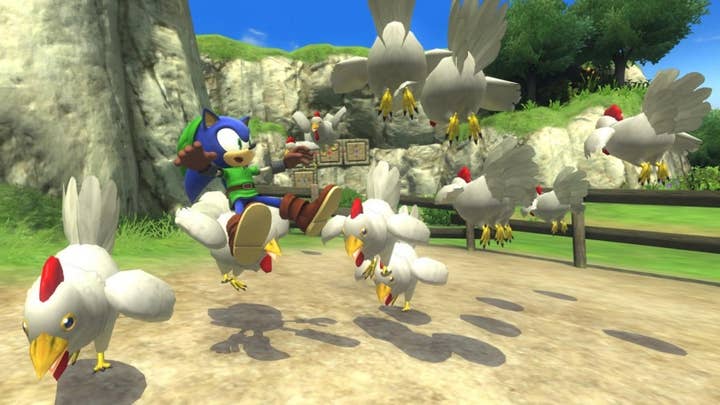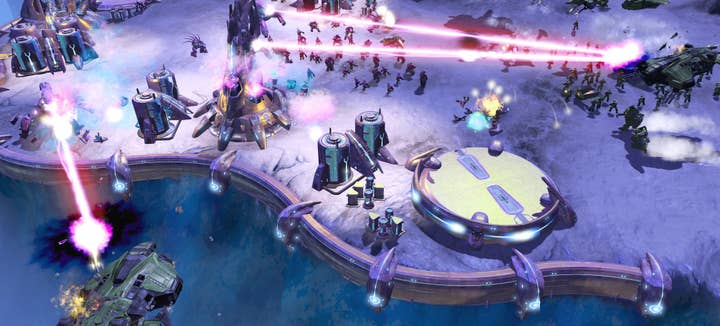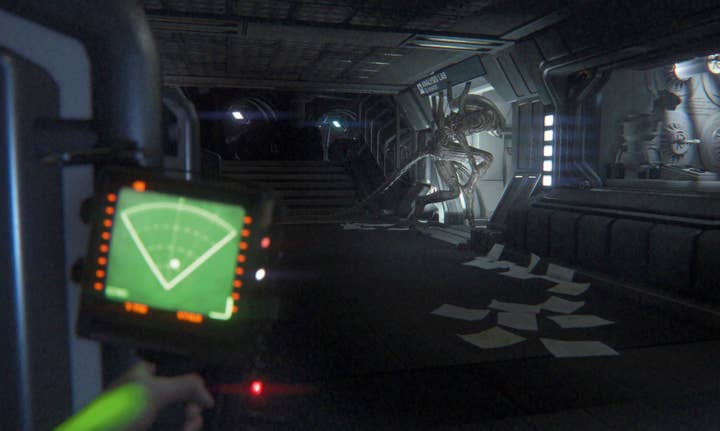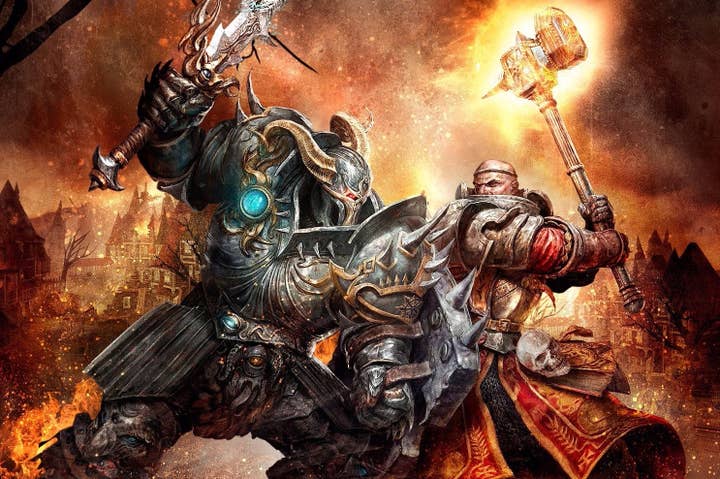Sega Europe: "We're definitely on the right track"
Niche PC franchises and European dev talent is now the bedrock of Sega's games business, with Creative Assembly leading the charge
To a journalist, context is both a powerful tool and a potential hazard. The conditions that make an event possible are often a better story than the event itself, the ability to identify and define those conditions as useful a skill as any in our collective armoury. Misjudge that process, however, and you run aground on the most common criticism levelled at the press: taking a quote, action or situation 'out of context,' and thereby creating a false context to take its place.
This happens regularly, but in my experience not nearly as often as the accusation is brandished. All too often, a company claiming that its words, deeds or financial position have been misrepresented is evidence not of journalistic misdeeds, but that company's desire to control the context in which it is seen. When the mask slips, it's rather easy to blame it on the click-hungry press.
"Sega Sammy is a big company...it's quite hard to digest how certain divisions are performing"
My mind was filled with such thoughts ahead of my meetings with Sega at Gamescom. It had been made clear that Sega wished to address what it saw as a misconception about the company's position, one stoked to life and perpetuated by negative coverage in the press. Articles like this one, perhaps, or this one, just two of many written in the last few years, a period in which Sega has appeared to be struggling for notable growth and, at times, even stability. In the last fiscal year, for example, the company's Consumer (read: games) business made ¥4 billion operating profit on ¥111 billion revenue. If there was a misconception here, I'll readily admit that it escaped my notice.
"Sega Sammy is a big company," says Jurgen Post, COO of Sega Europe, when we finally met, crammed into one of the several hundred flat-pack rooms that comprise Gamescom's business area. "We try to simplify it a little bit with three divisions: Sega Games, which is pretty much where we fall, we have a division for Pachinko and Pachislot, and then we have the Resort business, which is amusement parks and even gambling. And within those we have different divisions again. It's all rolled up into a big financial report, so it's quite hard to digest how certain divisions are performing."

This is the context that Sega wants to explain. Whatever else can be said about the performance of the company as a whole, or even that of the three umbrella divisions Post describes, Sega Europe is doing just fine. In fact, 2014 was its most profitable year since 2010, the end product of a series of decisions that have streamlined the company's European operations and shifted focus to its best studios and most valuable IP. Creative Assembly, Sports Interactive and Relic Entertainment. Total War, Football Manager and Aliens. For the most part, these developers and brands are controlled from and created within the UK and Europe.
"The world is changing," Post says. "In the past you had regions, and now, with Steam being so very important to us, the region is almost becoming global. For all the products coming out of our studios - Sports Interactive, Creative Assembly and Relic - we are responsible almost on a global level."
"Wherever you are, and whatever your play pattern is, we want to offer a game to suit that"
Sega is closer to being an entirely digital publisher than almost any of its longstanding rivals. In Japan, the business is increasingly built around mobile, and the results are beginning to show. Relic is the company's main North American studio, and both Dawn of War and Company of Heroes live on PC and online. The Creative Assembly and Sports Interactive are much the same, and Post highlights the latter's Football Manager series as the best example of what Sega has planned for the future. There is a full-strength PC version, a throwback "Classic" version for higher end tablets, a "Handheld" version for all other mobile devices, and the free-to-play Football Manager Online, which launched in South Korea in April. Total War is now similarly platform-ish, splicing with other big brands (Total War: Warhammer) and branching out into mobile (Total War: Battles) and MOBAs (Total War: Arena) as Sega attempts to build its audience across the world.
"Wherever you are, and whatever your play pattern is, we want to offer a game to suit that," Post says. "For every copy of Football Manager we sell, we know that 10 of them are being copied illegally. The potential of 10 million units, it could be 100 million units... They are playing, they want to play, so if you give it to them for free they might be willing to do some micro-transactions.
"We're on the right track, and that's how [Sega Sammy] look upon us. They see Europe as a very solid base. We've had a lot of changes in different parts of the world, but that's within a big company. There's always things going really well and other things you have to adjust. In general, we're definitely on the right track."

With all that in mind, the announcement that Creative Assembly would be working with Microsoft and 343 Industries on a new Halo Wars game was difficult to grasp. As the studio responsible for the Total War IP and Alien: Isolation, Creative Assembly is home to much of Sega's first-party creative talent, and probably its only AAA console team, which grew rapidly as Alien: Isolation entered full production. Managing a business is largely about managing resources, and yet Sega was giving up a chunk of one of its most valuable studios.
"How many opportunities do you get, as a company or a studio, to work with one of the biggest IPs in the world?" Post asks, in response to my query about Sega's thinking. "I believe it's testament to our strategy. Microsoft approaching us and saying they wanted to work with us because we're the specialists in this field - what a great opportunity that is. Nothing changes. The studio is owned by Sega, we will get a lot of learning, and we're happy to work with Microsoft."
"Making a AAA console game is bloody hard. We absolutely sweated blood for Alien: Isolation"
Tim Heaton, Creative Assembly's studio director, says much the same thing when we meet a few hours later. Microsoft approached Sega about Creative Assembly working on a Halo Wars game, and Sega allowed the conversation to take place. He calls it a "natural fit" - Microsoft benefiting from the studio's experience and "credibility," Creative Assembly getting the chance to flex its creative muscle with a brand the size of Halo.
"We're very cautious about our opportunities - that's why we've been around for 27 years," Heaton says. "Sega supports us, it invests in us, it has allowed us to grow and do the things that we've wanted to do. And we said to Sega that this is a great opportunity for us - for Creative Assembly - to build a team to make an action-RTS for console and PC. Sega supported us, and if we'd said, 'This isn't right for us, make them go away,' that would have been fine, too."
Of course, that isn't the whole picture. Regardless of how much love for Halo exists within Sega, a deal like this is near impossible to imagine without some kind of financial incentive. Such details are rarely discussed in a public forum, but it's clear that the size of Creative Assembly post-Alien: Isolation made the possibility of taking on a project that wouldn't bear the "Sega" logo that much simpler to justify. According to Heaton, the studio has almost 400 employees now, and "between a third and half" of them will be working on Halo Wars. More specifically, the team working on Halo Wars will be a modified version of the team that worked on Alien: Isolation, and the rest will develop the various iterations of Total War.
"Yeah, we've reconfigured it, that team," Heaton says. "But that's definitely the starting place."

Here, we can glimpse another possible context for Sega allowing its most experienced AAA console team to create a game for another company. Alien: Isolation was, after all, far from an unqualified success, selling 2.11 million units in a six month period that Sega's management described as "weak" in terms of unit sales. Post claims that the game's sales in that period were, "close to expectation, as in maybe we're achieving 85 per cent," and that Europe proved a stronger market than North America. He also believes that the game will enjoy a long tail on digital platforms, and he is probably correct.
"Do we really want to be spending very significant amounts of money, and getting close to break-even or just about in the black?"
But there's no avoiding the facts that, to some degree, Alien: Isolation fell short of what Sega saw as its commercial potential, and the bulk of its team will be working directly for Microsoft for at least a year, and probably two. Creative Assembly cannot be faulted for the quality of its work on Isolation, but both Post and Heaton were reluctant to discuss plans for a sequel. With Halo Wars, the risk of the AAA console market will be Microsoft's to bear, and Sega will have, "a team to make an action-RTS for console," when it's over.
"2.1 million sales? It just didn't break out," Heaton explains. "Am I happy about that? I'm not happy about that, right. I think it did under-index in America. I think the genre just didn't shine with an audience that would let us break out. 2 million is fine, right - let's be clear - but we were unsure right till the very end about whether we would hit that break out space or not.
"Making a AAA console game is bloody hard. We absolutely sweated blood for that game, we came through, and felt really happy at the end of it.
"Alien: Isolation 2 is not out of the question, because we're so proud of it and there's possibly more to be said. But do we really want to be spending very significant amounts of money, and getting close to break-even or just about in the black? That's not where Sega wants to be, when we have a brilliant portfolio of other games that do great business."

